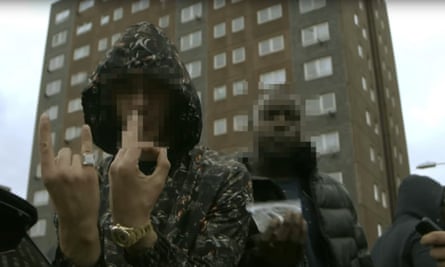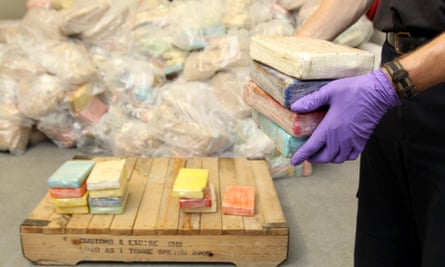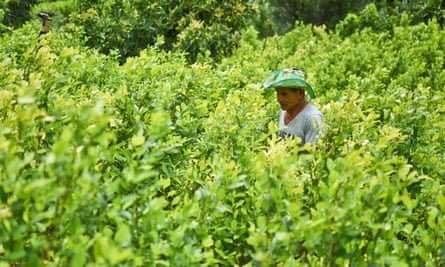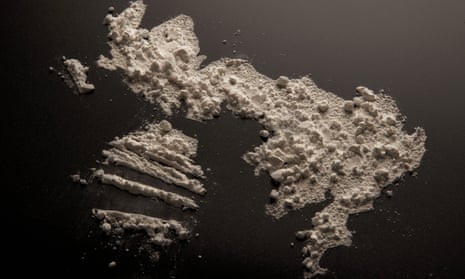Something had kicked off the night before and the guys on the corner were keen to offer advice. “You don’t want to be hanging around here too long,” one said, refusing to elaborate. They were standing near Crispe house, a tower block on east London’s Gascoigne estate, undisputed territory of Hellbanianz.
The gang, an Albanian street crew of drug dealers, is known locally for its violence and more widely for a social media output featuring Ferraris, wads of £50 notes and gold Rolex watches to help enhance its reputation and recruit “youngers”. The Gascoigne estate, built in the 1960s and occupying land that slopes south of Barking town centre to the Thames, is its historical home turf.
It was getting dark, another two men appeared and, when asked if they were Hellbanianz, one said: “You should go.” The Observer was escorted off the estate and told not to return.
Hellbanianz belong to the “retail game” of the cocaine trade. They are the street dealers and enforcers of the Mafia Shqiptare, the Albanian organised criminal syndicates who, the National Crime Agency believe, are consolidating power within the UK criminal underworld and on their way to a near total takeover of the UK’s £5bn cocaine market.
The gang’s glossily produced trap music videos remind viewers “HB are ready for violence” and that they possess the requisite manpower and firearms. Yet, police sources say, Hellbanianz occupy the lowest rung of the Albanian mafia.
To better understand the Albanians’ remarkable rise in the UK one might climb to the 12th floor of the Gascoigne estate’s high-rise blocks. From there, the skyline of London, where much of their cocaine will be snorted, stretches west. In the opposite direction, several miles along the Thames, lie the mammoth container ports where their cocaine is offloaded in multi-kilo shipments. But it is across the Atlantic, to the jungles of Latin America, where the story of the Mafia Shqiptare starts.
How Albanians came to conquer the UK’s cocaine market is a lesson in criminal savvy; the value of making friends with the world’s most dangerous mafias; and the absolute threat of violence.
It began with a business model that was simple in concept, but sufficiently bold to subvert the existing order. For years cocaine’s international importers worked separately from its wholesalers and the gangs. Pricing structure varied, depending on the drug’s purity; the higher it was, the more it cost.
The Albanians ditched the entire model. They began negotiating directly with the Colombian cartels who control coca production. Huge shipments were arranged direct from South America. Supply chains were kept in-house.
Intelligence obtained by British experts revealed that the Albanians were procuring cocaine from the cartels for about £4,000 to £5,500 a kilo, at a time when rivals thought they were getting a decent deal using Dutch wholesalers selling at £22,500 a kilo. The Albanians lowered the price of cocaine – and increased its purity. More massive consignments were brought into the UK.

Tony Saggers, the former head of drugs threat and intelligence at the National Crime Agency, who has spent 30 years analysing the rhythms of the global narcotics economy, said: “What they have done very intelligently is say: ‘OK, we’ve got these margins to play with and we’re going to give a good slice of that to the customer.’”
The Albanian effect has profoundly shaped the use, production and economy of cocaine. The drug is at its cheapest in the UK since 1990 and purer than it has been for a decade, which has caused record fatalities. The UK has the highest number of young users in Europe. More broadly, far bigger and more frequent shipments of the drug have been seized entering the UK as cocaine production in south America has hit record levels - up 31% on 2016.
Rivals to the Albanian gangs like Hellbanianz initially struggled to compete because they had an inferior, more expensive product. Their only option has been to buy cocaine sourced from the Mafia Shqiptare.
Saggers said: “They have shown that you don’t have to be greedy to dominate drug markets. They’ve gone down the route of sustainable prices, good quality.”
Mohammed Qasim, a research fellow at Leeds Beckett University who studys drug dealers, described the Albanian business approach as “fantastic”, adding: “If they were on Dragon’s Den with this model, all the dragons would be giving them money.”
Yet for the Albanians’ model to truly work it required control of Europe’s ports. For that the Mafia Shqiptare needed to collaborate with the ‘Ndrangheta, the most powerful and globalised of the Italian mafias, which controls mainland Europe’s cocaine trade.
There is considerable evidence that not only are the Albanians working with the ‘Ndrangheta, but that they have formed the tightest of alliances. Sources say the Italian mafia consider the Albanians as equals. Saggers said: “There’s a strong Italian-organised mafia link with Albanians now, Albanians are working with them – not in competition with them. Plus, historically, the Italians have good contacts in Latin America.”
Rotterdam in the Netherlands is Europe’s largest seaport, with eight million containers passing through each year. Many arrive via the direct “Colombian express” route before crossing to Harwich in Essex or Hull.
The second busiest European port is Antwerp in Belgium, which connects to the Thames port of Tilbury, 15 miles from Hellbanianz territory.

Collectively, the Belgian and Dutch ports employ 240,000 people, a cohort of whom, police intelligence indicates, work for the ‘Ndrangheta and Mafia Shqiptare.
“This gives the Albanians based on the near continent, direct access and control of it [cocaine] at the ports,” said Saggers.
An NCA source described Belgium and the Netherlands as “key nexus points of consolidation and onward trafficking of illicit commodities” and confirmed Albanian groups were “expanding their influence upstream” – police-speak for strengthening their grip on international cocaine supply.
Anna Sergi, a lecturer in criminology at the University of Essex who specialises in mafia relationships, confirmed Albanians and the southern Italian crime group have joined forces. “Whenever the ‘Ndrangheta is shipping things over, they work a lot with the Albanians,” she said.
Last month Operation Pollino, named after the area of southern Italy where the ‘Ndrangheta has its roots, arrested 90 suspects. Anti-mafia prosecutors described how the ‘Ndrangheta relied on “permanent groups working in ports and harbours” along with Albanian criminal networks.
In 2017 an Albanian cocaine dealer was caught at a London petrol station with false Italian identification documents on his car and two kilos of the drug hidden in its boot.
The most vulnerable point for drug smugglers is the port of entry. Security is tight, options are finite. Sources say that the ‘Ndrangheta has outsourced this element of the supply chain to the Albanians.
“You need the best people to get it out of port. If you are good at moving things then you stay ahead of your competitors – and the Albanians are good at this,” said Sergi.
Yet even the most senior Albanians are caught sometimes. Klodjan Copja, 30, who ran a £60m cocaine imports syndicate, was jailed in 2017 after his couriers were intercepted meeting drug-laden lorries arriving in Kent.
One striking facet of what the NCA term the Albanians’ “increasing prominence” is their having – so far – avoided becoming embroiled in tit-for-tat feuds with rivals. The latest UK criminal threat assessment says that the Albanians are unusually skilled at developing relationships and “forging links with other OCGs [organised criminal gangs]”.
Such relationship-building has left Liverpool as the only part of England not routinely selling Albanian-sourced cocaine. Not only has the Merseyside port its own direct access to South America, Saggers says that its turf is jealously guarded by the city’s own criminal gangs.

Also working in the Albanians’ favour is their reputation for violence. Saggers says the backdrop of the Kosovo conflict has given them a swagger comparable to that of Irish criminals during and after the Troubles.
“They are quite charismatic and known to prioritise relationship-building rather than competitive feuds. Also, when you come from a country where there’s been conflict and you have a reputation for ruthlessness the charisma is underlined with an element of ‘actually, we do need to get on with these people’,” he said.
Qasim also points to how the Albanian are regarded in criminal circles. “They are sophisticated, professional and they do what they promise. They always deliver,” he said.
This has much to do with the Albanian code of besa – “to keep the promise” – but Sergi adds that the reputation of the Mafia Shqiptare must also be viewed through the ancestral code of kanun, the right to take revenge: that blood must pay with blood.
“You most trust the ones similar to you,” she said. The concept was meant to keep things internal, close.
Then the younger generation began making flashy videos and waving money around, and along came Hellbanianz.
The Gascoigne estate is bordered on its south and west by the A13 and the North Circular roads, urban bulwarks against neighbouring gangs such as Newham’s Beckton Black Squad.
In the mid-1990s the estate was run by white working-class crime families. “If you were black and went there you’d come out in an ambulance,” said David, a former resident.
Deprivation and drugs blighted the estate long before a Jamaican gang run by Delroy “the King” Lewis started a ruthlessly efficient 24-hour operation on the estate, selling crack cocaine and heroin.
Lewis was jailed in 2004 at a time when the estate’s Albanian population was growing through a new refugee crisis following fresh unrest in Kosovo, five years after the war there brought the first arrivals. By the time of the 2011 census, Albanian was the second language on the estate.
Soon after, Hellbanianz took over. Rookwood House, a five-minute walk from Barking Abbey, became their notional headquarters. Linked by interlocking walkways and limited access points, the tower block was easy to defend from police and rivals. It was seen in the video for Hellbanianz’s trap track Hood Life. But five months ago Rookwood House was knocked down as part of a sweeping regeneration project.
Locals say Hellbanianz has moved operations north, to a prime spot near the Kings Lounge pub. “They gather at 9pm, same faces, same lot,” one said. Some might recognise the faces from YouTube where Hellbanianz posts footage to try to lure “falcons” – fresh recruits - with shots of scantily clad women, wheel-spinning Bentleys and the ubiquitious wads of money.
Saggers said: “The retail market is the get-rich-quick environment. If they’re importing kilos for a few thousand dollars, imagine how much money those youngsters are turning over if they’re selling at £40 a gram?”
Before its account was closed in November, Hellbanianz had 115,000 Instagram followers. The video for Hood Life, which opens with a drone shot of the Gascoigne estate, has been watched more than 7.5m times. The gang’s lyrics discuss defending Barking with “kallash” (AK47s)– and dishing out threats to rival Albanian outfit OTR ( On Top Of The Rest) and a fair few others. Their latest video, released in late October 2018, states they are “ready for war”.
One resident called Hellbanianz the “stabbers”. Requesting anonymity, he said: “You’d be walking home and feel a little prick on your leg and later you realised you’d been stabbed by one of the Albanian kids.”
Such disregard was evident in the case of Hellbanianz member Tristen Asllani, who in 2016 lost control during a high-speed police chase in Crouch End, north London, and ploughed into a shop. In the crumpled car, officers found a suitcase full of cocaine and later, at the 29-year-old’s home, another 21kg of the drug and a Skorpion machine pistol with a silencer.
Such antics help explain why Albanians are the third largest foreign nationality in UK prisons. The figure is even more startling when considering the tiny number of UK organised criminals the NCA believes are Albanian – 0.8%.
Hellbanianz’s high life – the bling, the violence – has fostered tensions within the Albanian community, particularly the goading of police. The Hood Life video shows gang members surrounding a Met patrol car.
“This goes against the Albanian culture. Some of their higher end drug dealers, international traders, don’t like this behaviour. It exposes their activities. They want to be low-key, making profits without being caught,” said Qasim.
On Longridge Road in Barking, home to its Albanian restaurants, some scowl when the gang or names of prominent members are mentioned. Others deny its existence.
Another repercussion of the Albanian model has, say some, helped fuel knife crime and drug disputes by making cocaine affordable to smaller, younger street gangs. A recent report by the London borough of Waltham Forest said gangs were moving from postcode rivalries to commercial enterprises focused on dealing cocaine. Last Tuesday, 14-year-old Jayden Moodie was killed in the borough during a targeted attack, though his family say he had no gang involvement.
Meanwhile, so long as Mafia Shqiptare keeps delivering their cocaine, recruiting teenagers to the Hellbanianz gangster life has never been easier.









